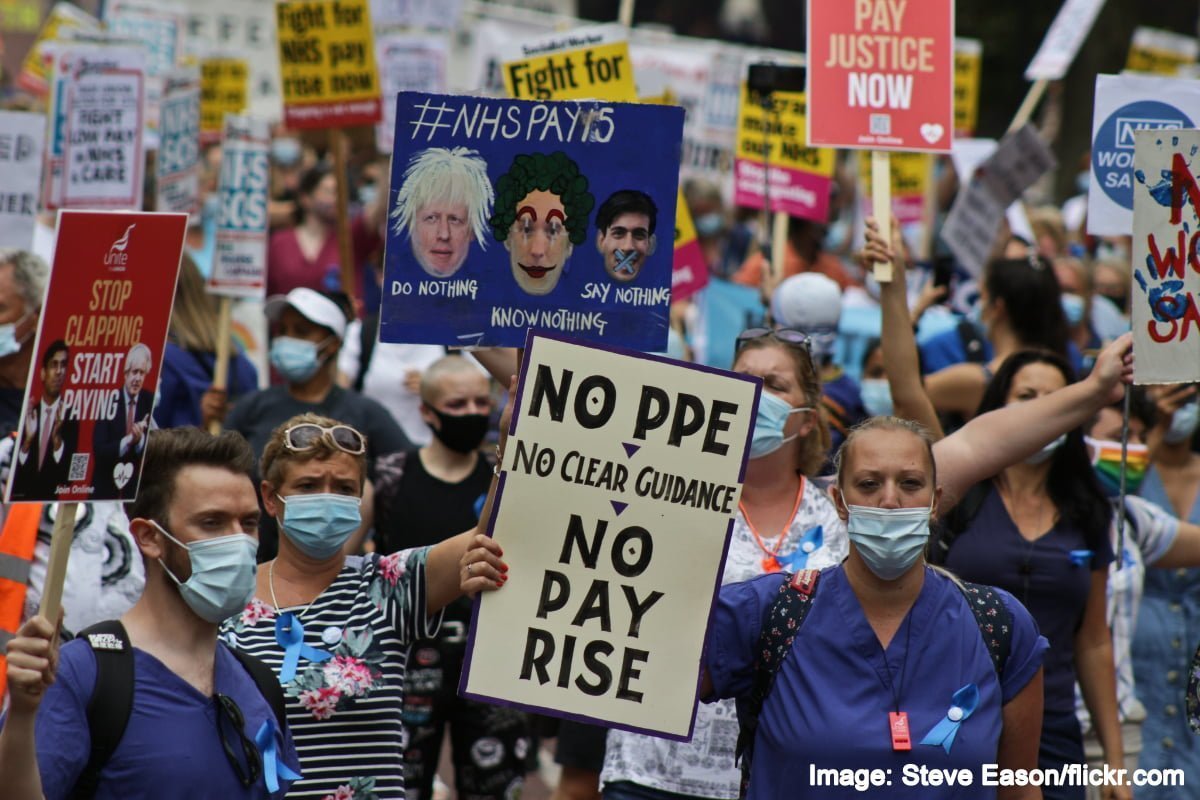Last Saturday saw healthcare workers and trade unionists come out in force across the country to demonstrate against the hypocritical Tory public sector pay offer. Union leaders need to step up and organise a united fightback.
On Saturday 8 August, NHS workers from Glasgow to London took to the streets with an ultimatum to this callous and hypocritical Tory government: clapping just won’t do!
These protests have erupted due to the scandalous neglect of thousands of vital healthcare workers from the Tories’ recent public sector pay rise announcement.
This has exposed the rotten hypocrisy of Boris Johnson and his Etonian government. Whilst applauding NHS staff outside Downing Street one day, the Prime Minister and his Tory clique have ignored healthcare workers’ pleas for decent pay the next.
The government has promised some sectors of public sector workers a wage increase of between 2% and 3.1% to reflect their “vital contribution” to society during the pandemic. But this is clearly a case of ‘too little, too late’.
On the one hand, this is an insulting offer to workers who have endured years of pay freezes (i.e. a decline in real wages), attacks on conditions, and cuts to public services. On the other hand, the deal leaves out whole sections of key workers, such as nurses, carers, and outsourced cleaners.
A long decade of vicious attacks on public sector pay and working conditions has left NHS staff feeling largely demoralised. And with little lead from the trade union bureaucracies or Starmer’s Labour Party, it has been left to workers to organise collectively from the ground up.
As a result, we have seen the rapid emergence of new grassroots organisations. One such group, Nurses United, was responsible for calling the national day of action on 8 August.
Right out of the gate, the radical demands of rank-and-file NHS workers have sidelined the conciliatory ‘settle-for-less’ attitude of the Labour Party and Unison leaderships.
Unite, GMB, and RCN unions have all supported the initiative of Nurses United. And ordinary members of the Labour Party and Unison have come out in force to express their solidarity.
Keir Starmer’s continued attempts to defang the labour movement – with his usual fare of reheated Blairism; ‘forensic’ critiques at PMQs; and limp calls for ‘national unity’ – have fallen flat.
And the lack of militant official representation has, if anything, pushed fresh layers into the political arena.
“I am no seasoned, veteran activist, or the most politically-minded person,” stated intensive care nurse Sarah Richardson at the Newcastle March for NHS Pay Justice. “What I am is a nurse, a mum, a partner, a daughter and a sister.”
“Like many of you here, I have never thought about attending a march, or even a protest, let alone having to organise one. But, like everybody here, when the government announced pay rises for a small group of public sector workers for their work during COVID – and missed out all of us – I was gobsmacked, hurt, and even a bit confused. Then all of that turned into anger.”
Sarah also described how, in spite of her young age, she has been forced to consider taking out life insurance, and to think about what would happen to her young children and family if she were to die.
Seeking protection from similarly desperate circumstances, tens of thousands have flocked to join Unison, the large public sector union. But, like Keir Starmer, right-wing Unison general secretary Dave Prentis will provide neither an outlet nor any direction to this movement.
The full force of the labour movement must be offered to the cause of healthcare workers. But this grassroots organisation must be accompanied by a genuine change at the top.
In particular, workers need a militant leadership that is willing to take a stand and call united industrial action across the public sector – from the teachers resisting unsafe conditions, to the council workers fighting against attacks on conditions, to the NHS staff now struggling for fair pay.
With Prentis set to retire, Unison members will soon have the chance to elect a new general secretary. Similarly for other big unions such as the GMB and Unite. It is vital that rank-and-file union activists organise to ensure that NHS workers – and all workers – have the fighting leadership that they need.
The anger is palpable. NHS workers have had enough. It’s time to fight back. #NHSPay15 #EnoughIsEnough pic.twitter.com/oHS9zAVa9m
— Nikita (@nicki_weston) August 8, 2020
London
Dan Langley, NHS nurse
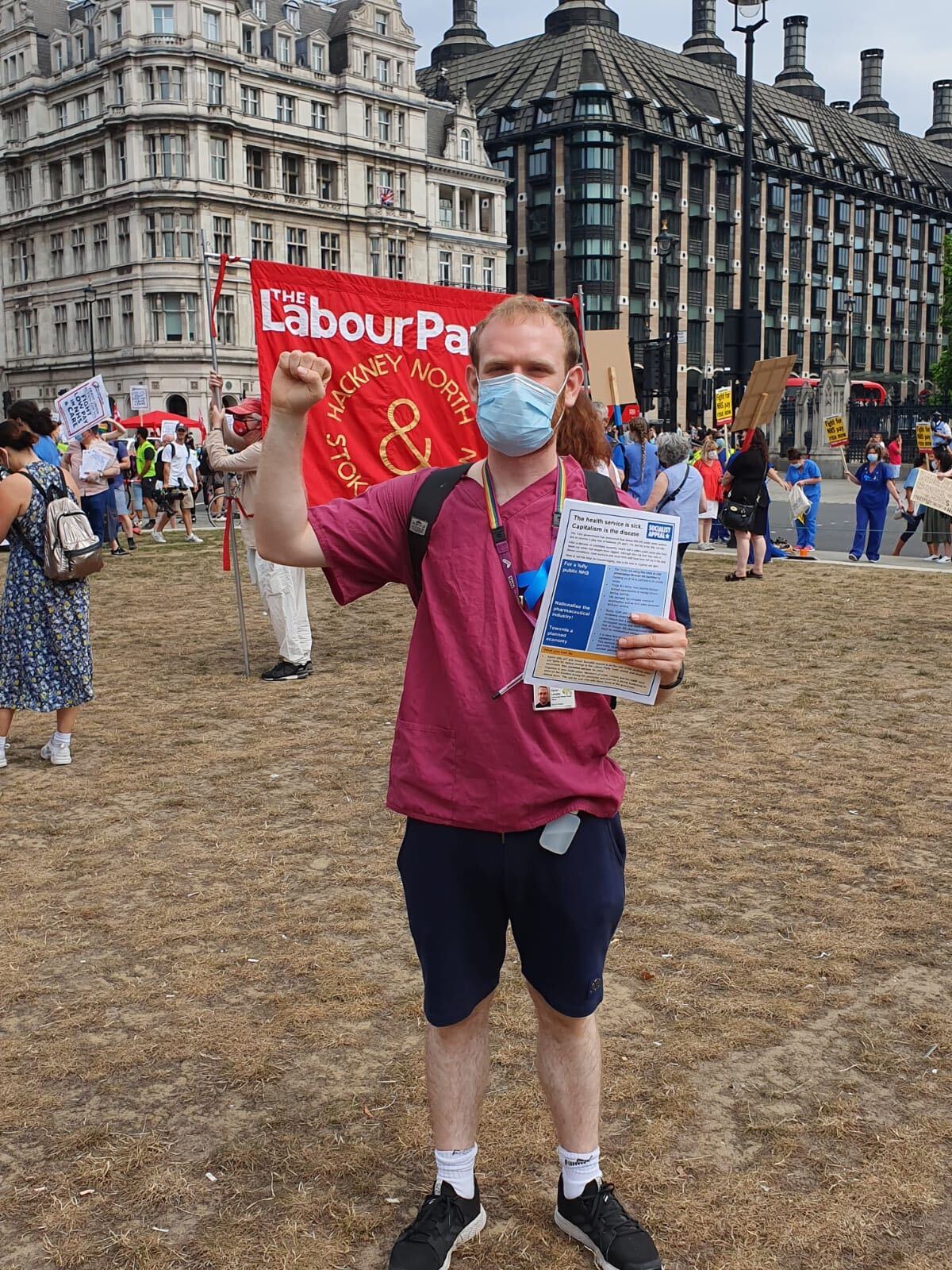 540 NHS and social care workers have died during the coronavirus pandemic. Over 100 of these have been nurses. They, just like those nurses still battling COVID-19, were denied safe staffing conditions or adequate PPE. On top of this, they have struggled against a 20% decrease in real wages over the last decade.
540 NHS and social care workers have died during the coronavirus pandemic. Over 100 of these have been nurses. They, just like those nurses still battling COVID-19, were denied safe staffing conditions or adequate PPE. On top of this, they have struggled against a 20% decrease in real wages over the last decade.
The anger was felt at the socially-distanced demo last Saturday, which began in St James Park. The spark for this demonstration came after a paltry pay offer was put on the table for 900,000 public sector workers.
This deal excluded those locked into a dismal pay deal until 2021. And it did nothing to address the wages lost to inflation, the food bank usage, the loss of the nursing bursary, or the staff dropping out of many health professions at an alarming rate.
Just before midday, health care staff and protestors stood in silence to remember those who have died from preventable deaths. After this, we marched towards Parliament Square, demanding the dignity that comes with fair pay – something that the Tories cannot offer us.
This was the key demand of the protests in London and elsewhere. However, there has not been a unified call for any specific percentage pay increase, as different unions (such as the RCN, Unite, GMB) have endorsed different outcomes. Some have not endorsed the protests at all and were entirely absent – namely Unison.
On the march, the chant ‘enough is enough’ could be heard loudly. We agree wholeheartedly with this sentiment. And that’s why workers and trade union members must call on the union leadership – who have held us back for so long – not only to get behind these grassroots protests, but to begin the long-awaited organisation of industrial action.
Nurses in the North of Ireland showed the beginning of a fightback recently, going on strike in both December 2019 and January of this year. We need to learn lessons from their struggle, and of workers’ movements happening all over the globe.
Liverpool
Daniel Harris, Liverpool Marxists
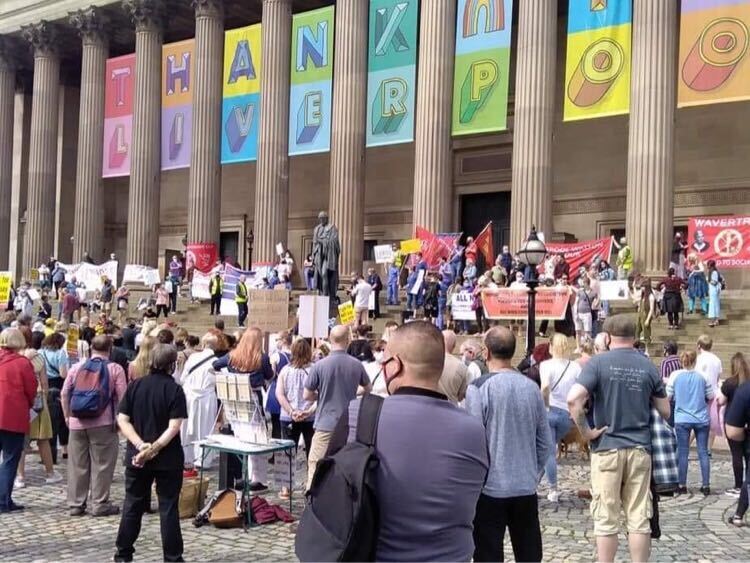 In Liverpool, large crowds gathered to demonstrate in defence of Merseyside health workers.
In Liverpool, large crowds gathered to demonstrate in defence of Merseyside health workers.
Laura Hother, a second year student nurse and member of Nurses United, gave a rousing speech highlighting the injustices she and her colleagues face. She pointed out that: “There’s one hundred thousand vacancies in the NHS; forty-four thousand of them are nursing vacancies.”
Retention is a major problem for the health service. Large swathes have resigned after becoming exhausted due to short staffing and a lack of resources.
Laura went on: “MPs have had eight pay rises above inflation in the last decade. In the last decade, the average nurse has had a twenty percent pay cut.”
This comes after footage from 2017 resurfaced recently, showing Tory benches erupting into applause when a Commons motion to scrap a 1% cap on public sector pay rises was defeated, exposing a scandalous double standard.
Laura then summed up the vacuousness of Boris Johnson’s empty platitudes:
“If our government – as they have shown us in words and claps – actually valued our NHS, they would fund it! They would make sure we had enough equipment. They would find a way to fill these forty-four thousand vacancies.”
After the demo, comrades of Socialist Appeal had the chance to briefly interview Laura.
Socialist Appeal: How did you get involved?
Laura Hother: I saw the NHS Workers Say No page on Facebook and was scrolling through the content, and saw a group of nurses and health care professionals who wanted change. I saw there were national demos happening, and I couldn’t let Liverpool be left out. I’ve always wanted to do more to try to save the NHS from privatisation and here was my chance to do it.
Socialist Appeal: What do you think of the atmosphere on the demo?
Laura Hother: I was so nervous at first, but once I saw people started turning up with their signs and excitement, I soon forgot I was even nervous. We got a rough head count of over 1000. It was amazing to have that much support there. The speakers were all amazing; so emotive and motivational. I think everyone felt that. I was so grateful for the support there and how interested others were to get involved for their local area or work.
Socialist Appeal: What do you think the next steps are for the movement overall?
Laura Hother: There are two key dates coming up this month. On Wednesday 19 August, badges received as a ‘thank you’ to health care workers are being sent back to Number 10. On 26 August, there are going to be workplace rallies for 30-60 minutes outside individuals’ work areas.
Our long-term goals are for a well-funded, well-staffed NHS, so that we can give our patients the care they deserve. We want to show our support for race justice as we recognise the underrepresentation of black and Asian workers in senior positions in the NHS. We must end the race pay gap, because no one should be paid differently because of the colour of their skin.
We want to keep our NHS public. The poor working conditions drive staff away, which is why we are fighting for fair pay and treatment of staff. The current environment is paving the way for privatisation, as the current NHS cannot provide as good a service. We also want care workers on the same pay system (a National Care Service) and good wages for all workers.
Glasgow
Shaun Morris, Glasgow Marxists
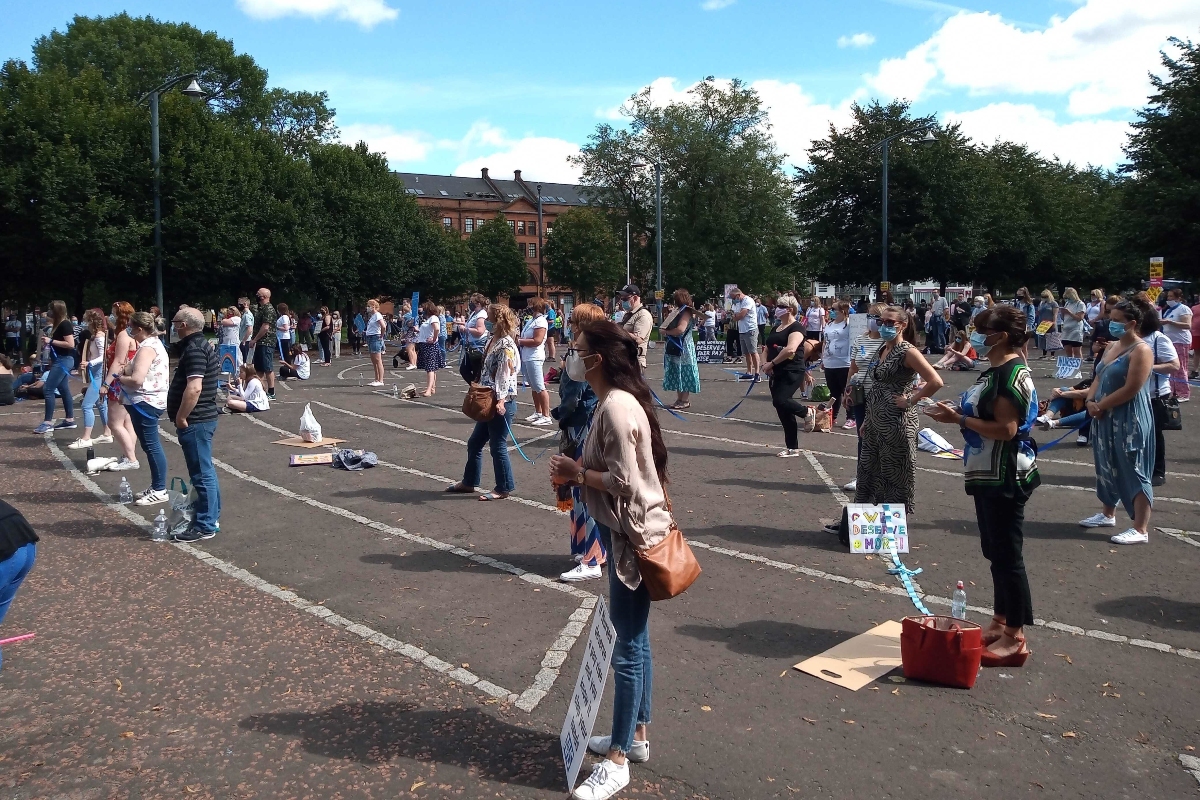 Approximately 500 nurses, healthcare workers, and trade unionists gathered by the McLennan Arch in Glasgow Green for the #NursesSayNo demonstration on Saturday.
Approximately 500 nurses, healthcare workers, and trade unionists gathered by the McLennan Arch in Glasgow Green for the #NursesSayNo demonstration on Saturday.
The strict requests for social distancing had not put many off, as the crowd spread out onto the green in a web of two-metre blue ribbons. As well as ensuring a safe distance, the blue ribbon is seen by many as a potent symbol of the movement to protect the NHS and fight for fair pay.
All speakers denounced the Tories’ pay policy, as well as the glaring hypocrisy of the ‘clap for the NHS’ campaign, which was swiftly co-opted as a PR stunt by Boris Johnson’s failing government.
Many had warned their friends and neighbours that clapping would not suffice. An industrial and political struggle for better pay and funding is needed to keep NHS staff away from the breadline.
The impetus for these protests may be the pay negotiations. But many speakers and attendees vented years of pent-up anger at the devaluation of the nursing profession, and the demoralisation and decline in an NHS left in Tory hands.
Chants of “enough is enough” summarised the mood of the day.
Leeds
Ben Potter, Leeds Marxists
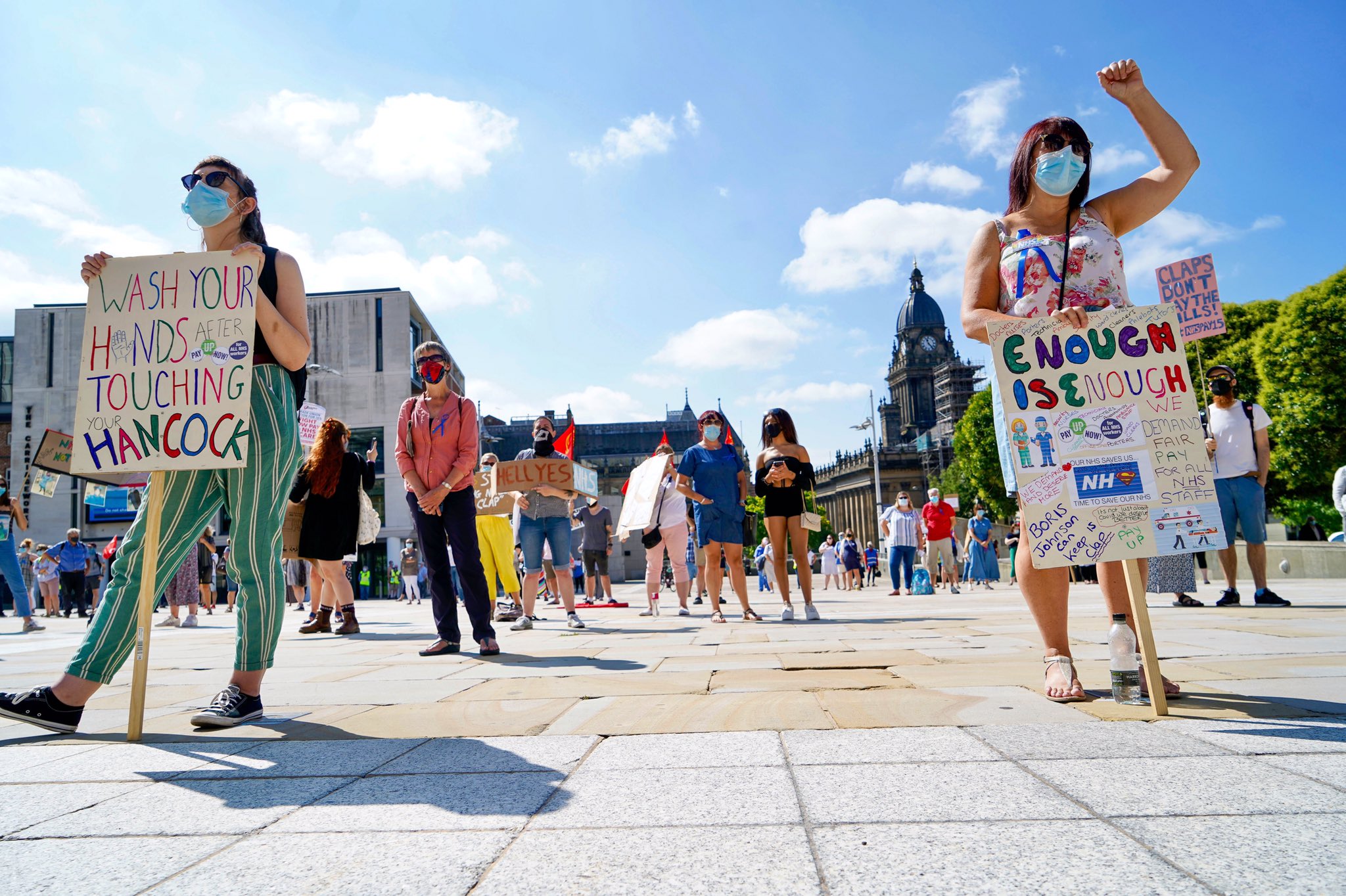 On 8 August, over a hundred people gathered at the steps of Leeds Town Hall to protest the snubbing of nurses and care workers in the recent announcement of public sector pay rises. Instead, the pay rise was offered to doctors and dentists only – many of whom are already in the higher pay grade.
On 8 August, over a hundred people gathered at the steps of Leeds Town Hall to protest the snubbing of nurses and care workers in the recent announcement of public sector pay rises. Instead, the pay rise was offered to doctors and dentists only – many of whom are already in the higher pay grade.
The demand was simple: a 15% wage rise. This would account for the stagnation of pay since 2008, which has ensured an unrelenting decline in real wages for NHS staff members.
Speeches were delivered by many veterans of the NHS, as well as other trade union activists. The mood was militant, with chants of ‘Our NHS! That’s our right – fight, fight, fight!’ being directed to the open doors and windows of the Leeds General Infirmary over the road.
Though the sun beat down relentlessly on the uncovered Millennium Square, each member of the demonstration raised their placards unabated.
A number of signs bore the phrase ‘From hero to zero’, which aptly encompassed the general mood. After months of being portrayed as ‘British heroes’, the Tories quickly cast this narrative aside at the first sign of NHS workers demanding better conditions.
The speeches at the rally highlighted the hardship of working in the NHS. Too many nurses and care workers across the country are racked with exhaustion and the anxiety of bringing a deadly virus into their own home. But many also spend their unpaid hours in food banks. The reality is that NHS workers and their families cannot feed themselves with applause and clapping.
Other speakers placed this phenomenon within the wider context of backdoor privatisation and the scandalous underfunding of the health sector. Calls were issued for a full nationalisation of the NHS.
It was these positive calls that provided hope in terms of turning around the dire circumstances facing the NHS.
No amount of applause can rival the power and militancy of workers when they are organised and refuse to be exploited any further.
Bristol
Kevin Ramage, Bristol West CLP
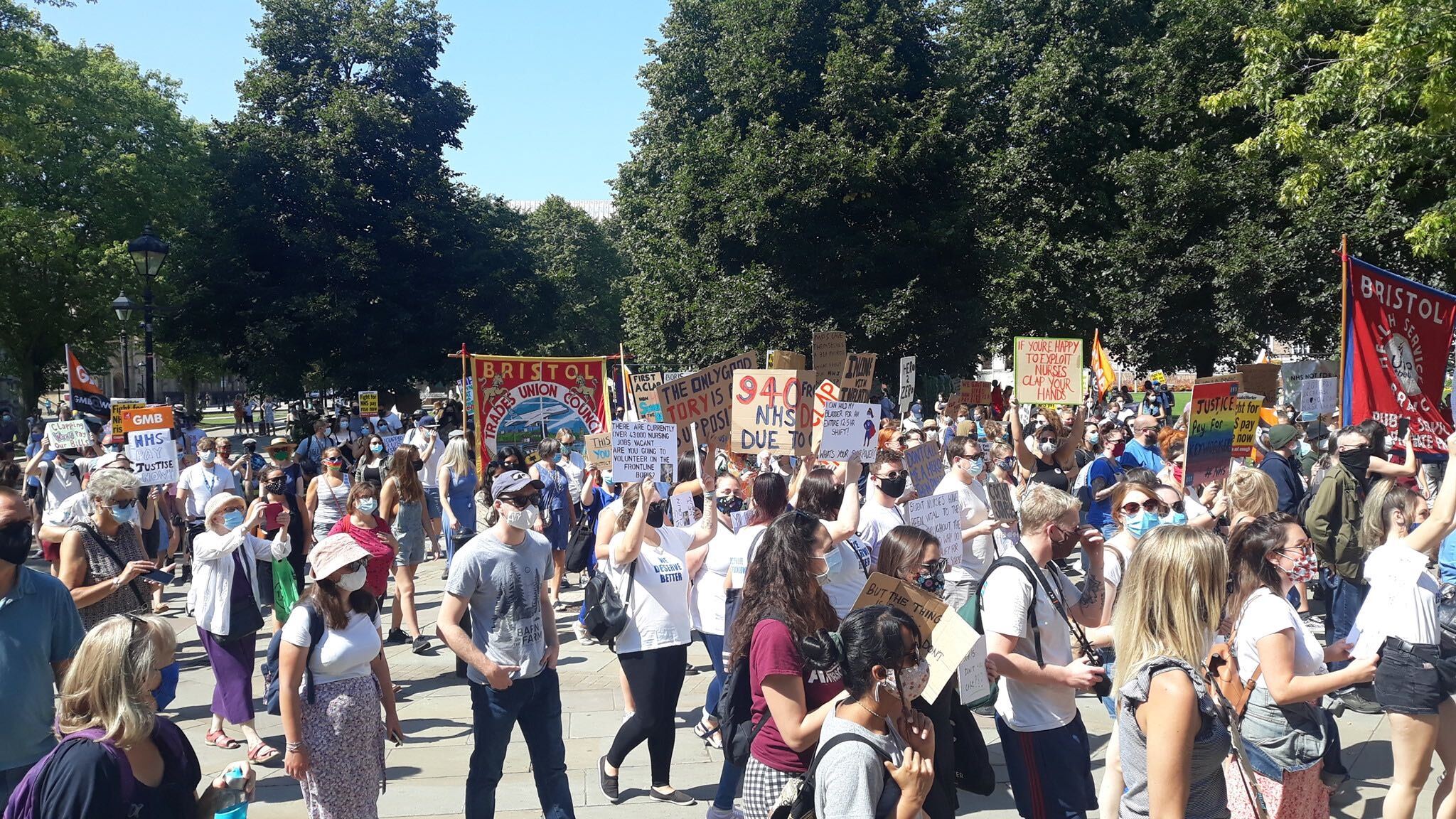 Well over 500 people joined a noisy protest supporting NHS pay in Bristol, with banners from Unite, Unison, GMB and NEU, as well as local Labour parties and the Trades Council.
Well over 500 people joined a noisy protest supporting NHS pay in Bristol, with banners from Unite, Unison, GMB and NEU, as well as local Labour parties and the Trades Council.
Saoirse O’Sullivan, a nurse at the Bristol Royal Infirmary and an organiser of the demonstration, said:
“I felt at the time that the clap for carers was a bit weird. The very first time, I have to say I cried. It was emotional. It was really heartening to see the public were supporting us.
“But the obvious determination of the government to not pay us a decent wage – it makes the claps feel really hollow now. We can’t get paid in claps, and we can’t spend the claps in shops.”
While the protest was assembling there was a ‘ride-past’ by several hundred bikers, known as ‘Rolling Thunder’. Although this was not connected to the NHS pay protest, many were ex-service personnel, who sounded their horns and revved their engines in support of the demonstration by trade unionists and NHS workers for a pay rise.
This was significant. A posse of bikers had turned up a few weeks ago to the reactionary ‘Defend the Statues’ protest in Bristol. No doubt some were the same people.
This shows how, in a small way, positive action and struggle by the labour movement can connect with layers of the working class who have been influenced in the past by the reactionary ideas peddled by the capitalist media.
Sheffield
Olive Rickson, Sheffield Marxists
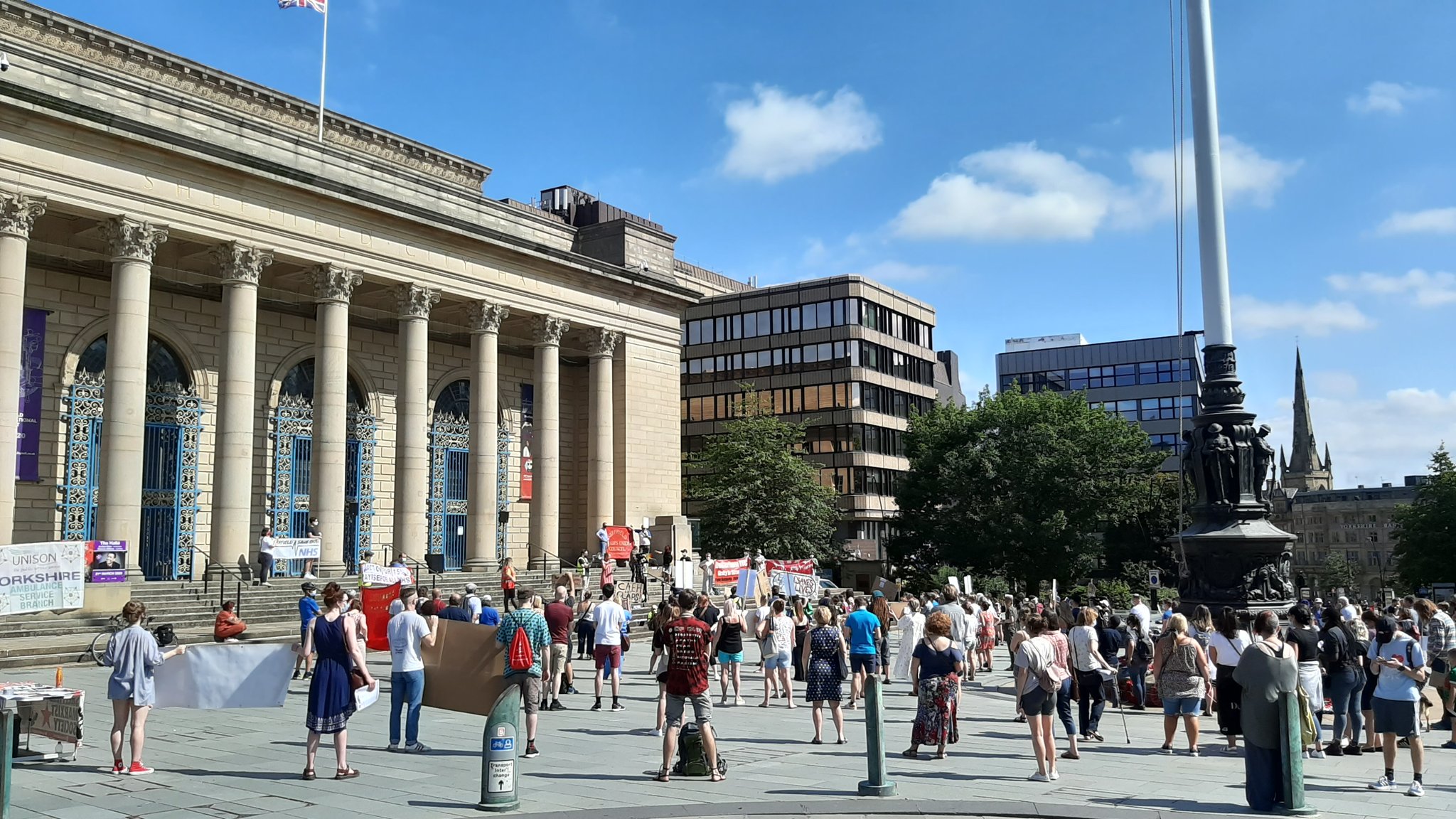 There were about 150 in attendance at the Sheffield protest for NHS pay, with mostly NHS workers as speakers. The mood was strongly anti-capitalist. The demand for a 15% pay rise was coupled with denouncements of the disaster of privatisation. And mentions of workers’ control were met with applause by the crowd.
There were about 150 in attendance at the Sheffield protest for NHS pay, with mostly NHS workers as speakers. The mood was strongly anti-capitalist. The demand for a 15% pay rise was coupled with denouncements of the disaster of privatisation. And mentions of workers’ control were met with applause by the crowd.
There was a clear mood of anger against the Johnson government’s callousness in their handling of the crisis and their hypocritical attitude towards NHS workers. But significantly, most NHS workers also highlighted the inaction of the union leadership, with one nurse pleading for the Labour Party and unions to ‘get off their knees’.
During the short march around Sheffield city centre, the demonstration was met with supportive car-horns and spontaneous applause.
The NHS was in crisis before the virus. Now it’s only getting worse. Workers can see through the empty hero worship and hollow clapping pushed by the establishment. People want real change.

